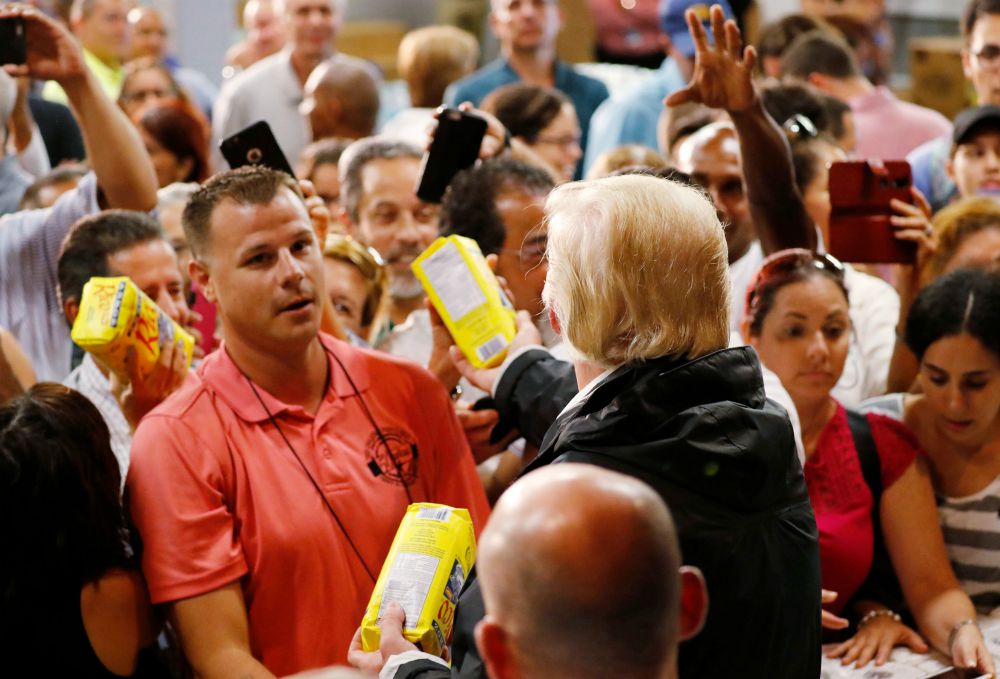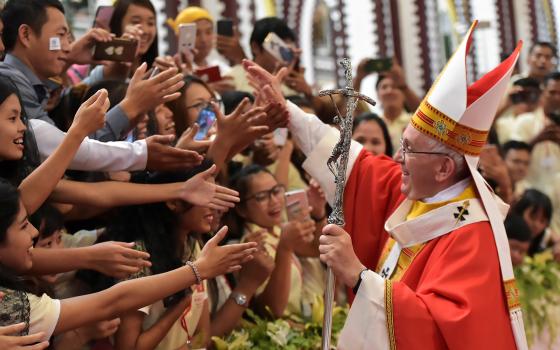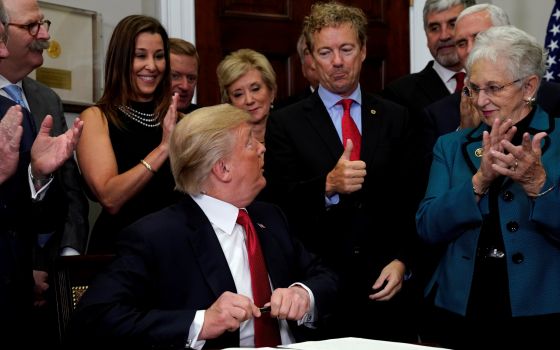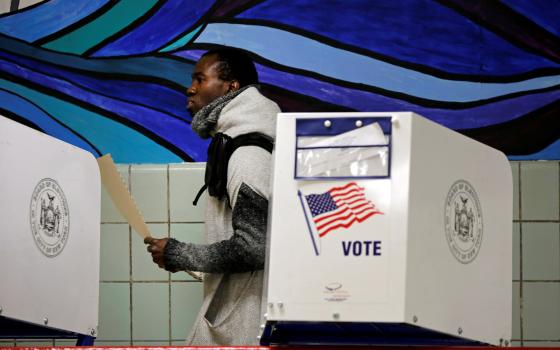
U.S. President Donald Trump hands out bags of rice to a crowd of local residents affected by Hurricane Maria during his visit Oct. 3 to a disaster relief distribution center at Calgary Chapel in San Juan, Puerto Rico. (CNS/Reuters /Jonathan Ernst)
Looking back at the political landscape this past year, there is one dominant fact: President Donald Trump stood astride that landscape more thoroughly than has any president since Franklin Delano Roosevelt. FDR served during two great national crises, the Depression and the Second World War, so his greatness was, in part, demanded by the circumstances of his time. Trump, on the other hand, dominated the political life of the nation through sheer force of personality and manipulation of media.
Every night, something Trump said, something Trump did, something Trump tweeted, leads the news. Like video of a slowly happening plane crash or train wreck, the camera can't leave Trump and the viewers can't take their eyes off him. No one knows when he will say something outrageous, or when he will say something stupid, or when he will display one of those rare moments when he actually looks and acts like a president. Trump wants the camera on him at all times, and in this regard, he gets what he wants.
Regrettably, and unlike FDR, Trump does not use his dominance of the political universe to build the common good. He does not use his communications skills to inspire the nation to follow its better angels. He does not display any of the canny diplomatic skill, either with Congress or with foreign leaders, that FDR brought to the job. FDR rightly is considered by historians to have been one of our greatest presidents. Trump does not know how to deploy his dominance for political ends, only for celebrity status.
No one runs for president unless they have a pretty large ego. Indeed, one needs more than the usual amount of self-confidence to undertake a job with such enormous responsibilities. Mr. Trump does not seem particularly conscious of the responsibilities he bears. Certainly, demonstrably, he is incapable of assigning the correct values to the choices he must make. He does not display what we normally think of as self-confidence. In him, we see narcissism. All the time. And on steroids.
Just as he put his name on buildings he helped build, just as he got himself not one but two "trophy wives," he looks at America now as his trophy country. The job of Congress, of the media, of his own nominee to the Supreme Court, is not to display competence, it is to praise him, acknowledge his greatness, shine a favorable light upon him. One man knows how to do this and has earned the president's praise and confidence: Russian President Vladimir Putin. America's adversary gets showered with praise, while Trump asks if he can withdraw the nomination of Neil Gorsuch to the Supreme Court after Gorsuch criticized him. Trump criticizes — or fires — whomever cannot give him what he wants and mocks those whose job it is to tell the truth. He undermines our allies if he thinks it will make him look tough. All of this is normal if narcissism is the norm.
Advertisement
Regrettably, it is almost impossible to resist normalizing even an abnormal presidency, even a morally aberrant presidency. He is still the president. When he calls you to a meeting, you go out of respect for the office if not for the man. You hold out hope that God, who uses the broken timber of humanity to accomplish his ends, will use this particular piece of broken humanity that resides in the White House, too. In moments of national challenge or tragedy, to whom else can the entire country turn except the president?
Unfortunately, it was precisely in such moments, when the country is begging to be brought together, that this president either drives us apart or instead focuses only on himself. This was seen most clearly in his tweet after the terrorist attack at the Pulse nightclub shooting in Orlando, that began, "Appreciate the congrats for being right on radical Islamic terrorism." There was no mention of sympathy for the victims. No thanks to the first responders who rushed to aid the injured. No waiting to learn something about the shooter, who turned out to have some pretty obvious sexual issues, before laying the blame on radical Islamic terrorism.
The president has developed a penchant for attacking African-Americans whenever he can. A black Congresswoman shouldn't be defending a black widow of a fallen soldier. A black father of a basketball player is insufficiently grateful to Trump for helping spring him from jail in China. Counter-protesters in Charlottesville were placed on the same moral footing as the white supremacists against whom they were protesting. Colin Kaepernick and other black football players are derided for calling attention to the latent, and not so latent, racism that continues to plague our country. And, if there is no black American handy, Trump is only too willing to attack immigrants: Within hours of a foiled terror attack by a Bangladeshi immigrant, the White House was targeting what they call "chain migration" and which the rest of us know as "family reunification."
We are assured the president is not a racist, and I actually believe he is not. It is worse than that. He is willing to use racism to advance his political standing. Any president will cause divisions by his decisions, and sometimes put those divisions to partisan objectives: President Barack Obama's unwillingness to use traditional exemption language for religious employers in the fight over the contraception mandate was done to shore up his support and financial backing from women's groups, and that was divisive, too. But, not since George Wallace, before his conversion, have we seen such consistent race-baiting from a national politician, and race is one of the nation's foundational wounds. Previous presidents of both parties have done their best to turn that wound into a scar, a reminder of the harm done but nonetheless a wound that is healed or at least healing. Not Trump.
A fortnight ago, I wrote about the dangers posed by the president's attacks on the integrity of Independent Counsel Robert Mueller and the FBI more generally. The drip, drip, drip of reports about the investigation into Russian meddling in our election can cause one to forget the enormity of what we are facing: In the face of incontrovertible evidence of a Russian cyber attack on our electoral process, the president either denies it altogether or relativizes it by bringing up Hillary Clinton's emails. He seems genuinely unconcerned about stopping further attacks. And the Republicans in Congress are so scared of their own base, which loves the president, that they are unwilling to put the security of the ballot, and therefore the legitimacy of our democracy, first. They do the president's bidding, trying to shut down the investigations in Congress and attacking Mueller and the FBI.
But for the Democrats and three Republican senators, close to 30 million Americans would have lost their heath insurance because the president and GOP leaders wanted to repeal the Affordable Care Act. The conscience of the nation can rest easy now that only 13 million Americans are likely to lose their insurance due to the repeal of the individual mandate contained in the so-called tax reform legislation that did pass the week before Christmas. Speaker of the House Paul Ryan can talk all he wants about the virtue of lower corporate taxes, but the fact is that the Republican Congress gave the entire nation fiscal coal in our Christmas stockings.
Speaking of coal, did you notice that the United States is now the only country to not be a signatory to the Paris climate pact? As the clock ticks closer and closer to the point when the damage to the environment may be irreversible, the U.S. government is taking a four-year time out in the fight to preserve the planet. There are only two things that can kill all of human life on the planet, a nuclear war and continued warming of the climate, and both grim prospects are a lot closer than they were when Obama was president.
And the Democrats? Don't get me started. In May, Democrat Heath Mello lost his bid to become mayor of Omaha, Nebraska after pro-choice activists criticized him, and any Democrat who went to campaign for him, because he supported modest restrictions on abortion while in the Nebraska legislature. None of the restrictions came close to the kinds of restrictions that are found throughout most European countries. In America, abortion politics is a zero-sum game for both sides, and both parties have abandoned their traditional role as a moderating influence and instead have empowered organized groups that pursue special and particular interests. Sen. Kirsten Gillibrand is now funding a primary challenger to Democratic Rep. Dan Lipinski, because he, too, is pro-life. At this rate, to win the nomination for the presidency in 2020, a Democrat will have to have procured or performed an abortion, and be willing to brag about it in public.
The Democrats are unified in their opposition to the Trump agenda, but that is like being in favor of apple pie. No one has emerged with a compelling, moral argument about why the Democrats should be elected. Everyone is running to the left as fast as they can, thinking that it is there that the nomination will be won, but instead of embracing the economic issues that Trump used so well last year, they are moving to the left on culture war issues. And, at a time when other nations are embracing a new generation of leaders like Emmanuel Macron and Justin Trudeau, the Democrats are led by Nancy Pelosi and Chuck Schumer, neither of whom communicates freshness and, in Pelosi's case, she has been the object of GOP attack ads for so long, her name is a kind of talisman for what Main Street America finds suspicious about the Democrats.
Donald Trump degrades everything he touches, and now the political system itself, which was not in the best shape beforehand, is being daily degraded by his assault on the media and his indifference or hostility to democratic norms. Our conservative friends, who had been fretting loudly about relativism for decades, are awfully quiet about Trump's dispensing with truth as a meaningful category. Moneyed interests are content to use him to advance long-standing objectives such as lower tax rates and deregulation. Any sense that there is a common good to be sought is like the stars at dawn: dim and disappearing. Not since the days of Charles Lindbergh and his American fascists or Joe McCarthy and his misuse of his office has the country been so threatened from within, and neither Lindbergh nor McCarthy ever lived in the White House. 2017 was a grim year.
[Michael Sean Winters writes about the nexus between religion and politics.]
Editor's note: Don't miss out on Michael Sean Winters' latest: Sign up to receive free newsletters, and we'll notify you when he publishes new Distinctly Catholic columns.








